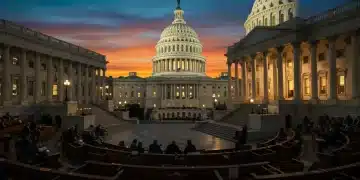Iran nuclear facility strikes prompt U.S. debate on security

The strikes on Iran nuclear facilities significantly impact U.S. foreign policy and regional stability, heightening tensions among countries, prompting military readiness, and influencing diplomatic strategies to address security concerns.
Iran nuclear facility strikes prompt U.S. debate about intervention tactics. As tensions rise, the implications for global security and the balance of power are hot topics. Are we prepared for the outcomes?
Understanding the context of Iran nuclear facility strikes
Understanding the context of Iran nuclear facility strikes requires a look at the historical tensions and recent developments. These strikes don’t happen in isolation; they’re part of a larger narrative.
In recent years, Iran has faced increasing pressure over its nuclear program. The U.S. and its allies worry that its facilities might produce nuclear weapons. The situation became tenser with regular accusations from various leaders about Iran’s intentions, which in turn prompted military actions.
Key Factors Influencing the Tensions
There are several key factors that contribute to understanding the backdrop of these strikes:
- The role of international sanctions and their impact on Iran’s economy.
- The influence of regional players, especially Israel and Saudi Arabia, in shaping U.S. perspectives.
- The implications of U.S. withdrawal from the Joint Comprehensive Plan of Action (JCPOA).
Each of these elements plays a crucial role in how the international community views Iran’s actions. The strikes against nuclear facilities are often seen as preventive measures aimed at curbing potential threats. Moreover, they signify a response to perceived aggressions from Iran.
International Perspectives
Countries vary in their responses to the Iran nuclear facility strikes. Some see them as necessary actions, while others condemn them as escalations of conflict. Recently, experts have noted that these strikes highlight deeper issues within nuclear non-proliferation efforts.
Experts argue that understanding the conflict requires acknowledging the complex web of alliances and enmities in the region. Moreover, the stability of the Middle East hangs in the balance as nations navigate these turbulent waters.
The impact of strikes on U.S. foreign policy

The impact of strikes on U.S. foreign policy is significant and multifaceted. Such actions often lead to shifts in diplomatic relations and military strategies. Each strike creates ripples that influence not only bilateral agreements but also international dynamics.
When the U.S. engages in military strikes, it conveys a clear message about its position regarding global security. These actions can lead to immediate reactions from both allies and adversaries. The implications for diplomatic relations can be profound. For instance, allies may strengthen their ties with the U.S. to maintain a unified front, while adversaries may feel justified in responding with hostility.
Short-term Consequences
In the short term, the strikes often increase tensions in the region. They may provoke retaliation, leading to escalated conflicts. Other countries might reevaluate their strategies and alliances. Military actions can trigger a reaction from international organizations, prompting discussions or resolutions.
- Increased military preparedness in nearby countries.
- Calls for emergency meetings among international leaders.
- Intensified media scrutiny on U.S. military actions.
The U.S. may also find itself under pressure to justify its actions to the international community. Critics often question the legality and ethical implications of such military interventions, raising concerns about the broader consequences.
Long-term Effects
Over time, strikes can reshape U.S. foreign policy priorities. A focus on military solutions may overshadow diplomatic efforts.Experts suggest that this could lead to a cycle where the U.S. relies more on intervention rather than negotiation. As global power dynamics shift, other nations might pursue their interests more aggressively, altering traditional alliances.
This changing landscape demands that the U.S. carefully considers its approach. Balancing military action with diplomatic engagement is crucial for maintaining global stability. The ripple effects of each strike inform future decisions and strategies in the ever-evolving realm of international relations.
Responses from international leaders and experts
Responses from international leaders and experts regarding the Iran nuclear facility strikes are varied and significant. Each leader’s reaction reflects their country’s stance on regional security and diplomacy. Understanding these responses helps clarify the global perspective on this critical issue.
World leaders have expressed concern over potential escalations. For example, European officials often emphasize the need for dialogue and diplomatic solutions. They argue that military strikes could complicate ongoing efforts to revive negotiations regarding Iran’s nuclear program.
Key Responses from Major Players
Several countries have voiced their apprehensions and strategies in light of these strikes:
- The United Kingdom calls for a careful evaluation of the implications, stressing the importance of diplomacy.
- Russia condemns military actions, viewing them as violations of international law and a threat to regional stability.
- China urges restraint from all parties, advocating for renewed talks to resolve underlying tensions.
- Countries in the Middle East assess their own security needs in the wake of military actions, reinforcing their military readiness.
The reactions from experts further illuminate the issue. Analysts warn that continued military engagement may lead to unintended consequences. Some argue that strikes may strengthen hardliners within Iran, making future negotiations even more challenging. Others suggest that international unity is necessary to address the threats posed by nuclear proliferation.
The Role of International Organizations
Organizations like the United Nations also play a pivotal role in shaping responses to the strikes. They often call for restraint and emphasize the importance of adhering to previous agreements, such as the JCPOA. Their efforts aim to provide a platform for dialogue and collaboration among nations, seeking peaceful resolutions.
As the situation develops, the chorus of voices from international leaders and experts continues to grow. Their insights contribute to a broader understanding of the complex dynamics at play, highlighting the urgent need for cohesive strategies to ensure global security and stability.
Potential consequences for regional stability

The potential consequences for regional stability following the Iran nuclear facility strikes are significant and far-reaching. These military actions often create a ripple effect across the Middle East, influencing geopolitical dynamics and security alliances.
One immediate concern is the potential for increased tensions between Iran and its neighbors. Countries such as Saudi Arabia and Israel may feel threatened, prompting them to enhance their military readiness. This can lead to an arms race in the region as nations bolster their defenses against perceived threats from Iran.
Escalation of Conflicts
Strikes can provoke retaliation and escalate existing conflicts. This may manifest as:
- Increased military operations in the region by Iranian forces.
- A rise in proxy conflicts involving Iranian-backed groups in neighboring countries.
- Heightened clashes along key borders, particularly with Israel.
Moreover, these actions may also embolden hardline factions within Iran, who advocate for a more aggressive stance against U.S. interests and regional adversaries. This change in posture could destabilize neighboring countries, creating a precarious balance of power.
International Reactions
International responses can also shape regional stability. Nations outside the Middle East may choose to intervene diplomatically or militarily, which can complicate the situation further. The involvement of global powers like the U.S., Russia, and China often leads to conflicting interests, making diplomatic resolutions more difficult.
In this context, the role of international organizations becomes crucial. They may call for dialogues and ceasefires to mitigate tensions. However, the effectiveness of these interventions largely depends on the willingness of the involved parties to engage in constructive discussions.
As the situation evolves, the overall stability of the Middle East remains uncertain. Each military action carries the potential to alter alliances and reshape the geopolitical landscape, stressing the importance of carefully negotiated solutions aimed at reducing conflict.
In conclusion, the Iran nuclear facility strikes have a profound impact on regional stability and international relations. As nations respond, the consequences of these strikes unfold, creating a complex web of diplomatic challenges. It’s important for countries to engage in dialogue to navigate the tensions and work towards lasting solutions. The global community must remain vigilant and proactive to ensure that peace and security prevail in the region.
FAQ – Frequently Asked Questions about the Impact of Iran Nuclear Facility Strikes
What are the immediate effects of the strikes on regional stability?
The immediate effects include increased military readiness among neighboring countries and heightened tensions, which may lead to potential conflicts.
How do international leaders respond to the strikes?
International leaders express a mix of concern and calls for diplomatic solutions, with some condemning the strikes and others supporting action against nuclear proliferation.
What role do international organizations play?
International organizations aim to mediate tensions and promote dialogue, advocating for peace and stability in the region.
What are the long-term consequences of these military actions?
Long-term consequences may include shifts in alliances, increased proxy conflicts, and a potential arms race, which can further destabilize the region.





